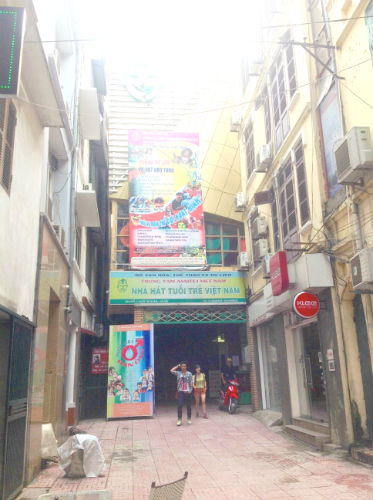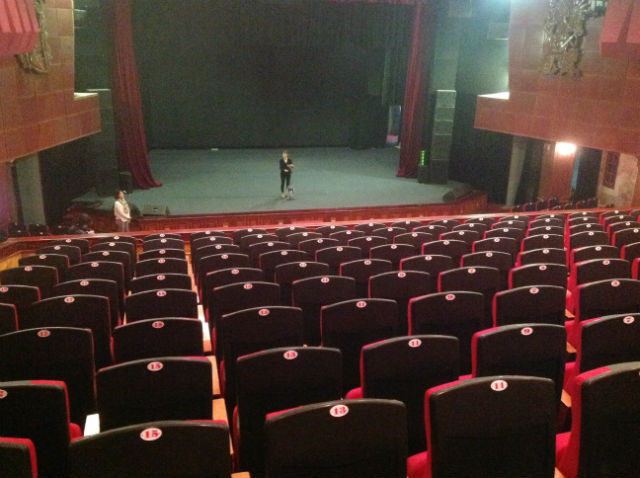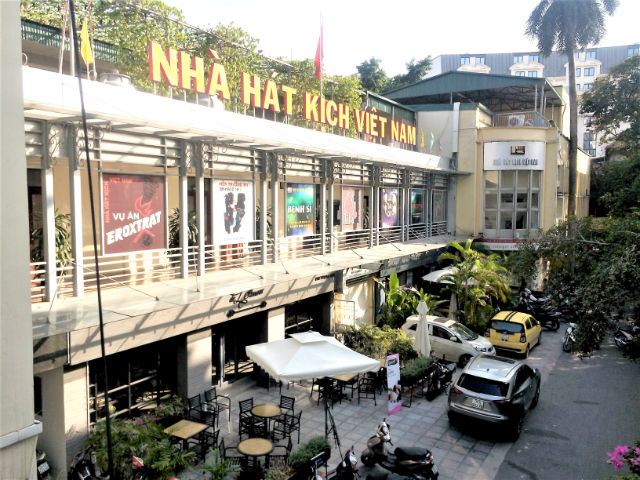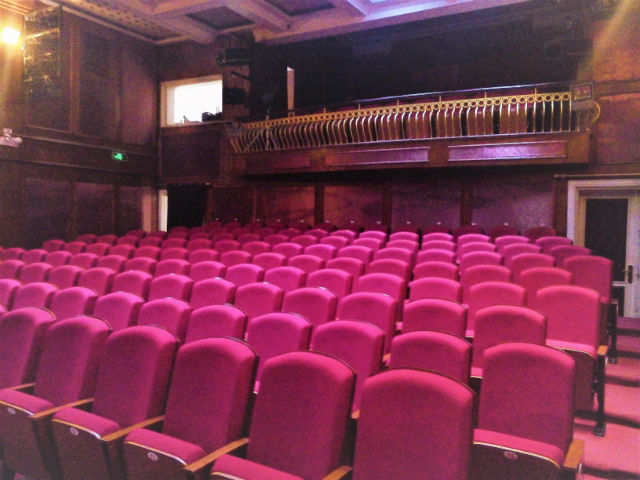Engaging in Joint Japan-Vietnam Productions
Hatori: So you spent a year in Vietnam. What are you working on now?
Muneshige: In Hanoi, I'm working on a collaboration with two national theater troupes, and in Ho Chi Minh City I am looking at trends in private theater troupes. Specifically, I plan to spend about three years creating a piece with the two national theater troupes in Hanoi.
Joint Production of an Anton Chekhov with the Youth Theatre of Vietnam
Hatori: At this stage, what proposals have you received for the joint production?
Muneshige: The Youth Theatre of Vietnam*6 have offered to do an Anton Chekhov with them, and we've worked out a three-year plan for that. Tsuyoshi Sugiyama*7 will serve as stage director for it. In the first year, I will go to several different places and do research and workshops to get a good grasp on the conditions in Vietnam, and then I'll start with writing the script. In the second year, I will work on production.
Last November, I took part in the Vietnam International Experimental Theatre Festival held in Hanoi, where I showed The Seagull which Sugiyama directed. The leaders of the Youth Theatre of Vietnam saw it and took an interest in working on a Chekhov with me. It's a project that also involves actors from Japan, and we're doing a lot of workshops as we go about making it.
*6 A nationally operated theater established in 1978. Currently, Pham Chi Trung serves as its director. It comprises three divisions – two contemporary theater troupes and a musical troupe – and the theater has 618 seats (after renovations the theater currently holds 588 seats). It has approximately 200 employees in total.
*7 The stage director for Theatre Center Without Walls. At the 2016 Vietnam International Experimental Theatre Festival, Sugiyama won the Best Stage Director Award.

Photo: Hiroyuki
Hatori: Are they familiar with The Seagull? Have they seen and read it?
Muneshige: They've read it, but I think there aren't many people to actually direct it or they just don't know where to start. Vietnamese theater is gradually dying out, sadly, and there are fewer younger students of theater aspiring to work in the field and as a result, they get left behind by the international community in theater. So that is a problem they have been dealing with for a long time now and been trying to slowly change the situation. I think they're trying to find clues from collaborations with overseas groups and trying to change the situation through practicing and actually being on stage with overseas counterparts.
Hatori: And that process involves sharing the questions you mentioned in the beginning: what type of theater will you work on, what is the significance of theater, and is theater necessary?
Muneshige: Yes. It's a process I learned through working with PETA, but we have to learn each other's cultures in theater: while we must learn about theirs, they too must also learn ours. As I said, I've been discussing the meaning of theater with PETA over two decades, so I am well aware that joint productions between different countries is not easy.
But at the same time, we can't spend another twenty years on it, so possibly we'll create a good foundation on which to nurture the younger generation in theater within the next four to five years. I have to condense the twenty years' worth of debating into five years, and continue to stay in Vietnam, learn their language, and just keep going. I think it will be good to keep the whole process and its information open.
Hatori: Yes, rather than just seeing the completed work, we would love for you to share the process of your collaboration.

Photo: Hiroyuki
Joint Production with the Vietnam National Drama Theatre: An attempt at Brechtian Theater
Muneshige: Another project I want to touch upon: the project with the Vietnam National Drama Theatre*8 is an attempt to revisit German playwright Bertolt Brecht and his position in Asia, and, through his Lehrsütcke [learning-plays], to work on a co-production while reflecting on the systems, forms, and playwriting of theater.
*8 A state-operated theater established in 1952. Despite being caught up in the long war, it has been a mainstay of support for Vietnamese contemporary theater. It has a theater with 180 seats and around 100 employees. Its director is Nguyen The Vinh. (The current director is Pham Anh Tu.)
Hatori: Will there be a stage director such as Sugiyama or someone from Japan involved in the Brecht project?
Muneshige: No, for now it will be me and a local stage director.
Hatori: That will be, how shall I put it, a lot of hard work.
Muneshige: Yes, it will be.
Hatori: About how old is the stage director from the Vietnam National Drama Theatre?
Muneshige: He's in his early fifties.
Hatori: Oh, so not necessarily a younger director.
Muneshige: The Vietnam National Drama Theatre doesn't have any younger stage directors. Training them is an urgent task that they face.
Hatori: I can't help thinking that this project will be even more difficult for viewers than Chekhov. Have you also already talked with them about which specific play you'll be doing?
Muneshige: We're thinking of doing Der Jasager / Der Neinsager [The Yes Sayer/The No Sayer].*9 The Yes Sayer portion of the play portrays how the villagers strictly follow the code of leaving the sick for dead in the valley when crossing over mountain; they actually throw them into the valley and leave them there. On the other hand, The No Sayer portion is nearly a repetition of The Yes Sayer, except that the person who gets sick refuses to be thrown into the valley, and he is brought back to the village with his group.
Through this project, I want to get the actors to think about the issues and problems embedded in the play and proceed by ask for their opinions: in learning-plays, the actors have to question and learn from the issues that are addressed in the play, and that itself will also trigger the audience to think about the issues.
The chorus particularly has an important role in this play as it explains, sings, the scenes as they're being performed. It will be hard to direct the play to keep it interesting; it won't work at all if it's a boring stage so we really have to keep the audiences hooked. I think the solution will be to avoid being too serious and to keep it playful.
*9 A learning- play written in 1930 by German playwright Bertolt Brecht as an adaptation of the Japanese Noh song Taniko.
Hatori: How long do you think it will take to put that together?
Muneshige: We plan to work on The Yes Sayer/The No Sayer for one year.


Photo: Hiroyuki






